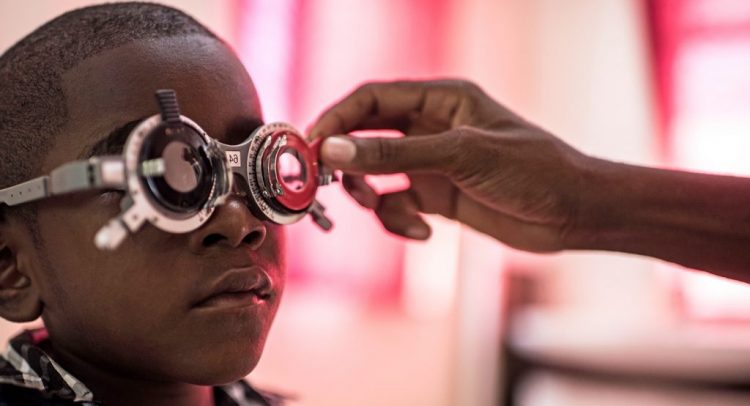A boy having an eye test.
About 2.2 billion people worldwide are living with vision impairment worldwide.
One billion of them are having the condition because they do not get the care they need for conditions like short and far sightedness, glaucoma and cataract, according to the first World report on vision issued by the World Health Organization (WHO).
It says an amount of $14.3 billion is needed to address the backlog of one billion people living with vision impairment or blindness due to short and far sightedness, and cataracts.
The report, launched ahead of World Sight Day on 10 October, found that ageing populations, changing lifestyles and limited access to eye care, particularly in low – and middle-income countries, are among the main drivers of the rising numbers of people living with vision impairment.
“Eye conditions and vision impairment are widespread, and far too often they still go untreated,” said Dr Tedros Adhanom Ghebreyesus, WHO Director-General. “People who need eye care must be able to receive quality interventions without suffering financial hardship. Including eye care in national health plans and essential packages of care is an important part of every country’s journey towards universal health coverage.”
Dr. Tedros added “It is unacceptable that 65 million people are blind or have impaired sight when their vision could have been corrected overnight with a cataract operation, or that over 800 million struggle in everyday activities because they lack access to a pair of glasses.”
The Report thus recommended stronger integration of eye care within national health services, including primary health care level, to ensure that the eye care needs of more people are addressed, including through prevention, early detection, treatment and rehabilitation.
Dr Alarcos Cieza, who heads WHO’s work to address blindness and vision impairment, indicated that, “Millions of people have severe vision impairment and are not able to participate in society to their fullest because they can’t access rehabilitation services. In a world built on the ability to see, l eye care services, including rehabilitation, must be provided closer to communities for people to achieve their maximum potential.”
The report states that all people living with blindness and severe vision impairment who cannot be treated are still able to lead independent lives if they access rehabilitation services which include optical magnifiers and reading use Braille, to smart phone way finders and orientation and mobility training with white canes.
By Jamila Akweley Okertchiri


